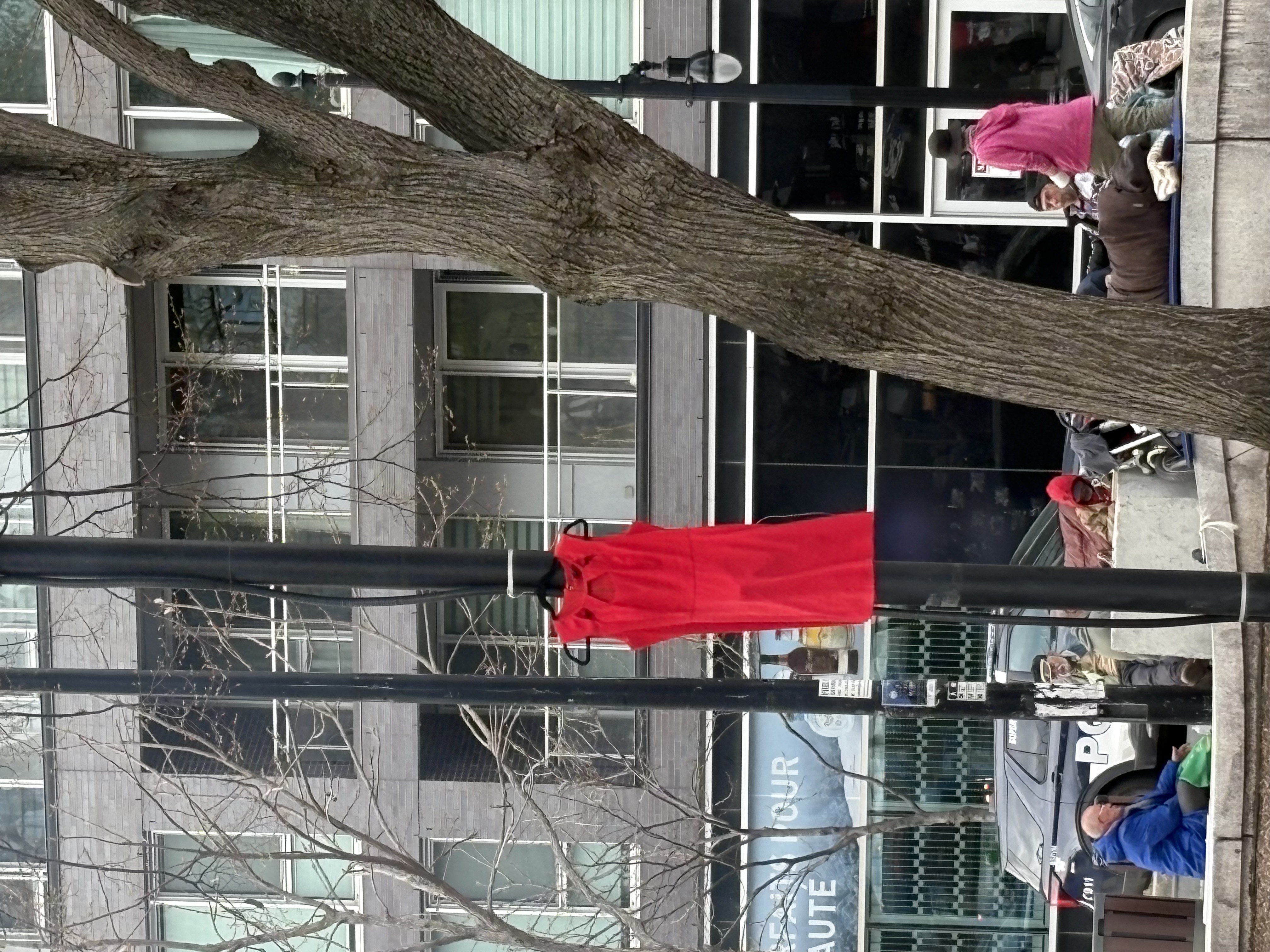On May 5, 2025, nearly 200 people gathered in Cabot Square for the Red Dress Day, an opportunity to remind the general public of the plight of the missing and murdered Indigenous women, girls, and 2LGBTQ+ people in Canada. In the crowd, the numerous pieces of red clothing are striking. The Day is Heavy with Emotions, Tears Are Streaming Down Some Faces.
The event is organized by the Iskweu Project, an initiative of the Montreal Native Women's Shelter. Representatives of the community are invited to the stage at the center of the square. Between songs, drum music, speeches and testimonies, it is time for meditation.

Pain and Anger
In the crowd, we meet Jolie-Ann, from the Anishinabe nation, a nation of Abitibi, near Lake Simon. She is wearing a red dress, and a hand is traced in paint across her mouth. She speaks of the loss of her cousin, a tragedy unsolved despite the years: “She was found by the side of Route 117, at the entrance of Val-d'Or. The culprit was never found. It’s going to be 22 years”.
“It is this feeling of injustice that brings me here – to denounce my family situation, along with all the families who are experiencing this loss today”, she adds.
The women who share their testimonies, on stage or among themselves, are unfortunately accustomed to hearing this kind of story. These tragedies, they know intimately. According to the Canadian Department of Justice, each year, the rate of femicide among Indigenous women and girls is 4.5 to 7 times higher than among non-Indigenous women. There is also an overrepresentation of Indigenous women in cases of unsolved disappearances.
Shara, a Mohawk from Akwesasne, pays tribute to them by singing a song on stage. A little later, she explains to us, her voice filled with emotion, that she, like her two sisters, has experienced sexual violence in her life. “That’s why I do all this, so that my children, my nieces, and my nephews don’t have to go through it”.
Sharing her traumas, exposing them, “it’s a healing, but it’s also an anger,” she confides.
In the crowd, Nahomé, from the Algonquin Anishinabe nation, holds up a sign on which we can read, in English: “They silenced her. I speak, I fight and I remember in red”. On her mouth, the same hand traced in paint. She recites a poem she wrote for the occasion. “What is important to remember on this day is that we are still here. There are many women who are taken and never come home. Today is a day to remember all those women who have disappeared”.

Still Waiting
Six years have passed since the release of the National Inquiry into Missing and Murdered Indigenous Women and Girls (MMIWG). But the 231 Calls for Justice from the inquiry report are slow to be fully implemented. On the stage at Cabot Square, the speeches evoke the frustration caused by this wait.
On the side of the federal government and the Assembly of First Nations, there is disagreement on the exact number of Calls for Justice implemented since 2019. For Senator and MMIWG Commissioner Michèle Audette, the establishment of an ombudsman position would allow for the monitoring of their implementation.
“Some calls will see the light of day, but for me, it’s not systemic; they don’t enter the system. So yes, that hurts. They say it’s a political will, but they don’t make it a priority”, the senator laments.
While the MMIWG recommendations are struggling to be fully implemented, Ms. Audette notes some positive outcomes from the inquiry commission. “It’s not going fast enough, but there are places where things are moving. The university environment, for example. Many CEGEPs (post-secondary colleges) will call me to come and talk about the MMIWG – it’s in the curriculums, in the courses. I find that ‘wow’! And at the Supreme Court of Canada, it’s used as evidence,” she rejoices. “With all that, we tell ourselves that maybe it’s sleeping somewhere, that it’s not moving fast enough, but there is a collective intelligence that means we will draw from this report examples or information that is valuable.”
Among the priority measures for the safety of Indigenous women, girls, and 2LGBTQ+ people, she advocates for the nationwide implementation of an alert system for the general public in case of disappearance. Already implemented in Manitoba, the procedure works in the same way as the AMBER Alert system. Ms. Audette will not fail to remind the new federal government of its usefulness, she confides.






.jpg)

%20(1)%20(1).jpg)
%20(3)%20(1).jpg)
%20(1).jpg)